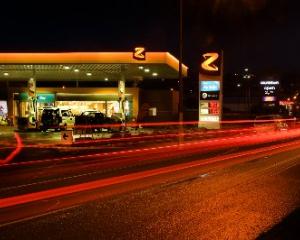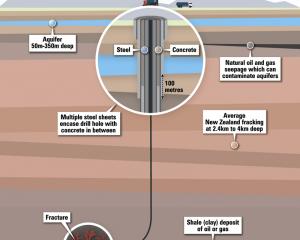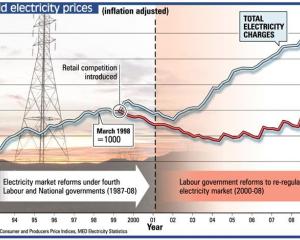Record electricity spot prices in May have spurred renewed calls for the Government to launch an immediate national power savings campaign.
Wholesale spot prices at Haywards Hill (Wellington) averaged 27.2 c/kWh over May - the highest average monthly price at the North Island reference since records began in 1996.
The figure, compiled and released today by the Major Electricity Users Group (MEUG), follows figures released yesterday showing last week was the highest weekly average price on record in both the North and South Islands.
Figures out this week also show hydro lake levels have dropped to 53 percent of average for this time of year - their lowest level since the last major power crisis in 1992.
MEUG executive director Ralph Matthes said if consumers failed to conserve power now, the country faced an increased risk of blackouts this winter as well as "significant" household power price rises.
He said the record prices - higher than in previous shortages in 2001 and 2003 - should send a clear signal to consumers and the Government.
"The record high spot prices for May 2008 are an indicator that the market considers we are in a riskier situation than in any prior crisis.
He also called on the Government to lift its effective ban on new coal and gas-fired power stations.
The Government has said such new thermal generation should only be allowed to ensure security of supply.
National Party energy spokesman Gerry Brownlee today said the Government should "bite the bullet" and immediately launch its planned campaign.
He said every indication was the country was heading for blackouts.
"Every bit of evidence that you see and all of those that have a stake in the industry would not be prepared to bet against it," he told NZPA.
"The Minister has been crossing his fingers and toes and hoping for the best.
"By doing so he is opening the door to a bigger crisis and more significant power shortages."
National is yet to release its energy policy, but Mr Brownlee signalled that new thermal generation could be in the mix.
"Electricity generating infrastructure is so far behind the sort of capacity you need to get past the current situation, that you really have to ask yourself questions about what is more important -- New Zealand staying economically viable, New Zealanders staying warm and comfortable in their homes, or not."
He said the country was only getting by without blackouts now because it was using gas and coal-fired plants to cover the shortfall in hydro generation.
A spokeswoman for Mr Parker reiterated the Government's stance that power saving campaigns were only effective for a few weeks and it was important not to start before it was really needed.
Prime Minister Helen Clark yesterday said Mr Parker briefed Cabinet about the power situation and she expected "more substantial advice" next Monday.
NZPA PAR gf ob
Source: NZPA Parliament
Credit: NZPA





